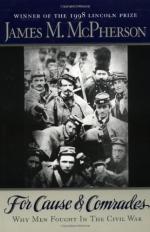
|
| Name: _________________________ | Period: ___________________ |
This quiz consists of 5 multiple choice and 5 short answer questions through Chapter 8, The Cause of Liberty.
Multiple Choice Questions
1. When a sergeant in the 8th Georgia wrote to his family in 1863 that he would willingly sacrifice his life upon the altar of his country, readers learn that he did so in which battle?
(a) Shiloh.
(b) Second Manassas.
(c) Bull Run.
(d) Gettysburg.
2. During the Seven Days battles, the 83rd Pennsylvania suffered what percentage of casualties?
(a) 25%.
(b) 75%.
(c) 98%.
(d) 50%.
3. In the discussion of the battle energy, an anemic Yale graduate--who later died at 26--recounted that the double-quick was not a fast enough pace; what disease did the man have?
(a) Tuberculosis.
(b) Scarlet fever.
(c) Bright's disease.
(d) Typhoid.
4. An experience at Gaines Mill on June 27, 1862, where the Union line slowly began to leak stragglers, was described by a corporal from which state?
(a) Georgia.
(b) North Carolina.
(c) Illinois.
(d) Pennsylvania.
5. During the discussion of "short-timers" psychology in the Union army, what was the name of the rule that prevented this phenomenon in the Confederate army?
(a) Southern Congress.
(b) Congress of Confederates.
(c) Richmond Congress.
(d) Richmond Confederacy.
Short Answer Questions
1. In May 1861, a lieutenant in a Pennsylvania regiment wrote he would not enlist for a period longer than ________, unless his country needed him, in which case he'd enlist for life.
2. Officers appropriated comfortable houses while enlisted men froze in tents in Nashville during November 1864. From what state was the private who complained in his letters?
3. While talking about religious fatalism, McPherson says that more soldiers were practical Arminians than strict __________________.
4. During the battle of Fredericksburg, from which state was the corporal who wrote his diary that he was sick, and if not for being thought a sneak, he wouldn't be in the ranks that day?
5. As the book opens, McPherson says that he took some Princeton students to Gettysburg in the spring of what year?
|
This section contains 293 words (approx. 1 page at 300 words per page) |

|




